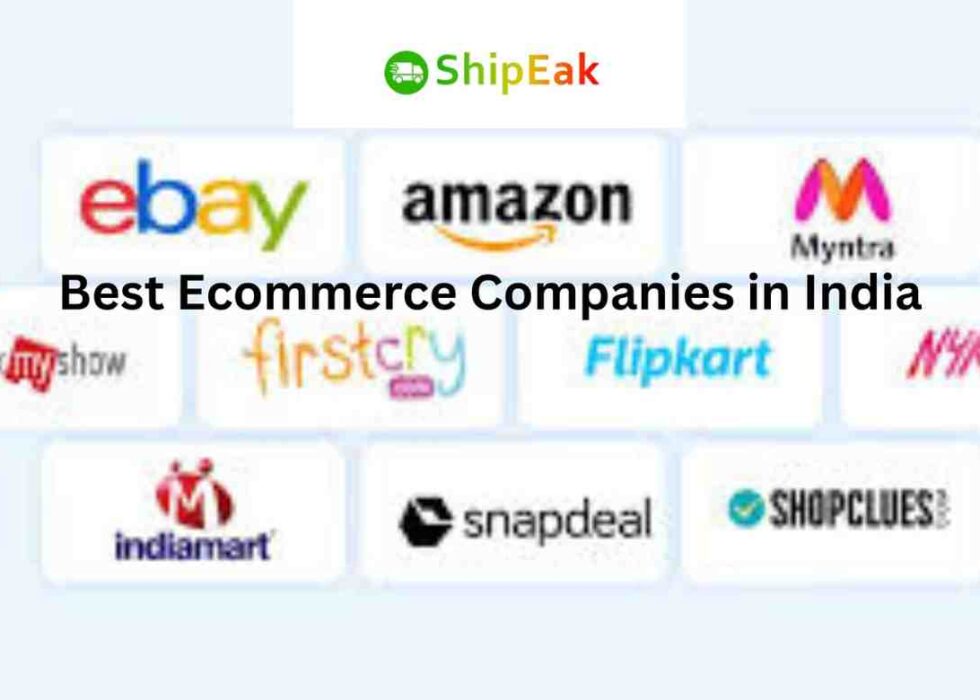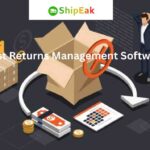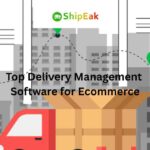
Top 10 Best Ecommerce Companies in India
Introduction
People love shopping online and in the past decade, the world has witnessed an unprecedented growth of ecommerce stores. The same stands true for India where the worldwide rise of ecommerce and a pan-India digital penetration resulted in the ecommerce boom.
This has given rise to social commerce brands and bigwigs like Meesho. The love garnered by ecommerce companies in India, especially, in Tier 2 and Tier 3 cities, is a result of the wide variety of things available online. It’s a huge contrast from what shoppers can get in their local offline stores.
However, online shopping isn’t the go-to option only in those cities. It is also the popular choice among people living in the busiest metros of India. Why? Because online shopping is easy and comes with a lot of benefits like sales and discounts.
In this post, we are going to talk about the top ecommerce companies in India in terms of popularity and market share.
Top 10 Ecommerce Companies in India
Customers are often confused about which ecommerce websites they should shop from. The confusion is understandable because a lot of shoppers have fallen prey to fraudulent websites that accept orders and payments but never actually deliver.
Since the entire online shopping experience rests on trust and transparency, it’s important customers know which sites they can trust. Here’s our pick of the best ecommerce companies. Take a look!
1) Amazon India
Amazon is a household name in India. Until some years ago, it used to have Flipkart as its biggest competitor but Amazon has significantly improved its services since then.
Even the website and app interfaces have undergone huge developments making it one of the easiest to browse eCommerce stores in India.
Amazon’s crazy popularity is kind of understandable given how it has a vast collection of products across at least 11 categories like books, home appliances/renovation, fashion apparel & accessories, groceries, electronics, etc.
It also has 6-8 big sale events every year – Prime Day, Republic Day, Black Friday, Freedom Fest, Great Indian Festival, Christmas, Holi, etc.
Apart from selling, Amazon has also branched out into providing shipping and fulfillment services through Amazon Shipping and FBA (Fulfillment by Amazon).
2) Flipkart
To talk about Flipkart is to talk about a history dotted with acquisitions and mergers. Flipkart started in 2007, and like Amazon, focussed on selling books initially.
Some of the first categories to be added were electronics, home improvement, fashion, lifestyle, etc. Flipkart has fully and partially acquired many companies since its inception, like Jabong, Myntra, Arvind Fashions, ABFRL, Cleartrip, and many more.
The Flipkart marketplace currently sells items in 9 categories. It is Amazon’s biggest competitor in market size and also a few segments like electronics. Flipkart also provides hyperlocal deliveries in India in selected serviceable areas.
3) Nykaa
Nykaa was established in 2012 as an online cosmetic platform. The brand quickly became one of the leading platforms with products from over 2000 well-known brands across the globe.
To establish a stronger presence, the channel adopted an omnichannel fulfillment approach by opening over 78 stores across India.
It also became the first ecommerce brand to enter the men’s grooming space.
The platform has three in-house brands in the cosmetic sector. Along with this, it has acquired fashion and lifestyle brands like 20Dresses, Pipa Bella, Dot and Key, and LBB.
These acquisitions brought the total count of the Nykaa in-house brands to 9, allowing it to become one of the largest cosmetic D2C platforms in the Indian market.
4) IndiaMART
IndiaMART leads the ecommerce wholesale segment in India. It is the second biggest B2B marketplace in the world and one of the oldest in India.
It is also the platform with the largest product categories. Buyers on IndiaMART can fill out the form on the website stating their requirements to get quotes from all registered sellers or suppliers.
They can choose from the offerings and quotes. IndiaMART also has a Seller Academy that teaches sellers how to use the platform for maximum benefit, understand terminologies, and reach out to the best buyers quickly.
5) Meesho
Meesho started its operation as a reseller platform in 2015. The main drivers of Meesho’s sales at that time were social media platforms like Facebook, WhatsApp, and Instagram.
Meesho was the first social selling platform in India. Since 2021, Meesho has seen such rapid growth that it was named one of the most influential companies in a list published by Times Magazine.
Today, Meesho connects millions of sellers, distributors, and manufacturers across India with potential buyers. It is no longer a marketplace meant specifically for reselling but it still has many resellers on its platform.
Meesho’s main aim has been to use the power of the internet to help people from small-town India set up a business with practically no investment.
Its current goal is to create micro-entrepreneurs throughout the country. On Meesho, individuals and businesses showcase their products and sell them at very minimal profits. Like most marketplaces, Meesho too, works on a commission basis.
6) FirstCry
Till only a few years ago, there was virtually no ecommerce brand in India selling baby clothes exclusively.
FirstCry was the first company to enter this segment and has since been the category forerunner.
What started with a chosen selection of baby garments has now grown to include several items related to kids and newborns.
They include – feeding essentials, picture books, bed protectors, baby food, nursery decor items, maternity care products, and more.
It provides a great selection of items and hosts the most sought-after brands on its platform, like Hamley, Babyhug, The Mom Store, etc.
Its biggest competitor is Hopscotch, which is the second placeholder in the category.
7) BookMyShow
BookMyShow has a long history spanning over 20 years. BigTree Entertainment was established in 1999 but the ticketing aggregator platform that we are familiar with didn’t come into being until 2007.
Until then, the company had acquired Vista, a New Zealand-based ticketing software. It also provided technological support for many companies in the early 2000s.
After becoming the official ticketing partner for IPL in 2010, BookMyShow started seeing rapid development. Soon after, it launched its mobile app, which was redesigned recently.
Today, BookMyShow is the biggest ecommerce company in India for booking tickets for plays, movies, events, sports, and other activities. It supports live streaming for many online activities like Sudoku championships, etc.
8) MakeMyTrip
MakeMyTrip is a pioneer ecommerce travel portal in the Indian Market. The platform was introduced in 2000 as the first domestic travel portal in India to make travel easier for Indians.
The company has over 28 domestic offices and 7 international locations, along with 4 airport booths for a traveler’s convenience.
It allows seamless travel by providing cab, rail, and flight bookings. It allows you to scout and reserve villas, hotels, and apartments for your travel ahead of time.
9) Snapdeal
Snapdeal is another ecommerce website like Amazon or Flipkart but with a different target audience. Most of Snapdeal’s shoppers come from Tier 2 and Tier 3 cities, however, there are also many from big cities.
The reason Snapdeal is a big competitor of both Amazon and Flipkart is because it sells similar products but at a much lower price. Most of Snapdeal’s items are non-branded. Although Flipkart tried to acquire Snapdeal in 2016, the deal never came through.
As of now, Snapdeal is available on big screens through the website and on smaller screens through their mobile app. It has a similar category list to Flipkart and Amazon but the variety and number of products on display is limited.
However, on the upside, it’s more cost-effective than the two and hence, is one of the biggest competitors in the ecommerce marketplace space.
10) TataCliq
Tata Cliq opened its online marketplace in 2016. It is owned by the Tata Group. The ecommerce company started off by selling fashion, beauty, footwear, and electronics items.
Soon, however, electronics took a backseat and Tata Cliq focused its attention on fashion and beauty products.
The company also launched a luxury segment called Tata Cliq Luxury where it houses premium domestic and international brands. It has another offshoot called Boutique.
Tata Cliq shoppers can return their products in exchange for store credit, called Cliq Cash, which gets saved in their accounts.
How to Select the Best Ecommerce Company in India?
With more than 19000 eCommerce businesses in India, selecting the best eCommerce company from the countless options available can be daunting.
With so many possibilities, the most crucial characteristics to consider while selecting are the following.
1. Serviceability/Pin Code Reach
Serviceability is the most important factor to consider when deciding which eCommerce firm to shop with. Ecommerce stores that ship/deliver to your desired places are undoubtedly the best. As part of this strategy, some of these companies explore platforms like Shiprocket to optimize shipping automation and delivery reliability.
Most of us become loyal fans of a few brands. Say, you want to send your friend a birthday gift from your favorite shop.
You will no doubt feel disappointed if your favourite online company does not deliver to your friend’s location. Poor pin code reach may also lead to cart abandonment issues and low sales.
Therefore, as an ecommerce company, you will need to increase the areas you deliver to. Moreover, with the rise of online shopping trends in rural and suburban India, more and more ecommerce marketplaces and stores are faced with delivery issues in remote areas.
Improving shipping logistics is the only way to reach customers in today’s ecommerce world.
2. Products, Services, And Benefits
Each eCommerce business and platform offers a distinct range of products and services.
The best online store is one that distinguishes itself from the competition by providing a vast selection of products and services along with quality. This is the only sure-shot way of getting repeat customers to your shop.
From garments to household needs, food to electronics, Amazon, Flipkart, and Snapdeal have it all.
While Ajio, Myntra, and Limeroad are fashion and clothing websites, BookMyShow is a ticketing website.
The ideal eCommerce platform provides a wide range of services and benefits in one place, removing the need to switch between apps. Some of these platforms may also provide online store builder services.
3. Payment Gateways
E-Commerce is all about making shopping easier for regular people. Having the best products and services on offer is important to bring in customers and keep them coming.
However, their checkout journey must also be equally smooth and hassle-free. Every time a brand fails to provide what its customers want, it risks losing one. The same goes for payment options.
Most online platforms have several payment gateways customers can choose from – PayPal, RazorPay, AmazonPay, GPay, Netbanking, Credit or Debit Cards, Pay/Cash on Delivery, etc.
It’s ideal to have partnerships with all these different POS systems so that brands can offer their customers the luxury of choosing.
4. Delivery Speed
Fast shipping is essential for any shopper these days. They become nervous over a period of 3-5 days. An eCommerce company with fast-track deliveries guarantees customer happiness and fewer cancellations.
Before deciding on the best option for you, verify the estimated delivery time. For Made to Order products, estimated delivery durations are not written down explicitly. However, most sellers will give a time period (10 – 12 days) by which the product will be dispatched.
Since Amazon started providing the same and next deliveries, customers have wanted nothing less. In many cases, free shipping is only available for standard deliveries.
But that, too, is changing soon, with retailers releasing fast shipping is crucial to customer happiness. And that is directly proportional to higher customer lifetime value and better sales.
5. Tracking Visibility
Order tracking visibility is critical for a positive post-purchase experience for the customer. An eCommerce company must provide real-time order tracking with automatic regular updates to track more transparently. Customers must be aware of every delivery milestone crossed by their order.
Enabling tracking visibility also reduces the WISMO calls on your platforms and ensures the customer about the status of their order.
It allows you to improve post-purchase engagement through product recommendations and brandings on the tracking page of the order.
6. Proof Of Delivery
The Proof of Delivery (POD) is an essential element of the modern day eCommerce delivery process. This allows you to verify the numerous deliveries with the carrier.
It facilitates better customer order management & allows you to resolve customer complaints about completed deliveries faster.
POD is also important in implementing newer methods like contactless delivery. It mitigates other issues in the order delivery systems like fake deliveries, returns fraud, etc.
Majority of the top rated carriers provide this as an optional service. The proof of delivery provided can be shared with the customers through the order tracking notifications.
7. Returns Management
It’s not always the case that you’ll like what you order; some purchases are for testing purposes, while some can be faulty.
In such instances, the best eCommerce company has a solid returns management system, wherein a pick-up time is established, and the company is responsible for ensuring the package retraces its stages to return to the enterprise.
As the returns process can be complex, having an eCommerce returns management system in place is vital. With returns management, you can enhance the customer’s return experience.
Along with that, you can improve your returns workflow for better operational output.
8. Track Record And past Reviews
Customer reviews allow you to assess the performance of the product and the platform services in real-world scenarios.
The only precaution you need to take is to ensure that the reviews are verified. They have to either be from a verified buyer or be posted on a trusted platform.
They are also a great way to determine the quality of customer support on the platform. For example, a customer was not satisfied with the product or service and posted a bad review.
An explanation or a resolution from the customer support team in the comments depicts the good quality of customer service.
Top 5 Useful Tips to Build a Successful Ecommerce Company in India
If you really look at the numbers and analyse customer behaviour correctly, building a successful ecommerce empire is not very difficult.
We have chosen 5 tips that are crucial to delivery and customer satisfaction that’ll make your business a phenomenon.
1. Exemplary Delivery Experience
The delivery process is the physical point of contact between the customer and the product. The nature of this experience will essentially determine the perception of the customer towards the brand. Therefore, it becomes vital that the delivery is executed seamlessly.
For any outstanding delivery experience, there are two main components – delivery speed and smooth execution. Using a multi carrier shipping software in ecommerce will allow you to improve your delivery speed.
For better execution of delivery, you will have to borrow some features from the post-purchase experience, including personalized notifications and real-time order tracking.
2. Post-Purchase Engagement
The post-purchase period is crucial for every ecommerce business. It is a period where the customer is likely to face buyer’s remorse or find a better deal. That is why it becomes important to keep the customer engaged throughout this period.
Post-purchase experience enhancement features like a branded tracking page with personalized product recommendations will allow you to improve customer engagement.
This will also allow you to generate revenue and re-engage the customer to make more purchases.
Personalized communication paired with a tracking page will reduce the number of WISMO calls from the customer and enable a laid-back shopping experience for the customers.
3. Innovative Customer Acquisition
A well-built platform and seamless delivery won’t be useful unless you are able to attract customers to your platform.
Customer acquisition and retention can be a tricky part of ecommerce. Therefore, you have to think outside the box. Since the marketing field is constantly evolving, adapting to it.
The use of newer methods of marketing, like influencer marketing, social media marketing, and content marketing, will allow you to attract more customers.
Along with that, older methods like flash sales still are a sure-shot way of acquiring new customers.
4. Smooth Omnichannel Shopping
Many companies on the list above have both brick-and-mortar and online stores.
Over the course of a few years, logistics and ecommerce experts have realised that combining online and offline channels is the best way to build a brand.
That is only achievable if these companies provide omnichannel retailing. In omnichannel, the buyer’s journey remains intact no matter which platform or sales channel they shop from.
The rise of social commerce through Facebook and the power of targeted aesthetic ads on Instagram has shown sellers that shopping can happen anywhere.
However, merging offline and online inventory to provide that same seamless delivery experience is often tricky.
To excel, brands must make inventory changes live and transparent and provide delivery options like BOPIS, ROPIS, BOPAK, etc. A logistics software can help smoothen these supply chain wrinkles.
5. Diversified Sales Channels
A lot of what makes an ecommerce business successful depends on its selling strategy. One crucial component of online sales is the number and type of platforms and marketplaces you sell on.
What works for one business may not work for another. Therefore, research before you start registering on any site because all these selling channels charge a seller’s fee.
Once you’ve finished researching about what platforms are better suited to sell your type of products, it’s time to diversify and increase profitability.
Focus on which channels can give you faster results and aim to increase growth potential there. Other networks may take longer if it depends on other factors like SEO, site ranking, etc.
Conclusion
And that’s all, folks! We’ve walked you through what we think are the top ecommerce companies in India right now and why and we also shared our tips on how you can choose the best one to order from.
We hope these tips will help you steer clear of fraudulent websites and make your shopping experience a peaceful one from now on.
For business owners, we hope the tips really help you strengthen and grow your business. Also, among the eCommerce companies we listed, some accept registrations.
If you’ve waited to start selling on any of these platforms, it’s time to get started! We wish you all the best in your endeavours.
FAQs
1) Which is the biggest sector in the Indian Ecommerce industry?
According to research by Google India, the Fashion and Apparel ecommerce industry is the biggest sector in the Indian Ecommerce market.
Right now, the sector has a market cap of 8-10 billion dollars with an average growth rate of 35 percent.
2) What is a key factor contributing to the growth of ecommerce?
The increase in the use of digital payment methods like UPI and Bank cards has contributed to the accelerated growth of the ecommerce sector in India. The improved smartphone and internet penetration in the non-metro regions over the last decade has also been an influential factor.
![Shipeak [Official] Blog](https://www.shipeak.com/wp-content/uploads/2025/05/logo_1.png)







